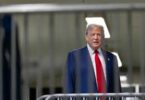David Nather, Margaret Talev
WASHINGTON DC: It’s not lost on historians that Donald Trump’s impeachment trial acquittal will fall on Presidents’ Day weekend, a holiday celebrating the examples set by America’s first president, George Washington, and Abraham Lincoln, who held the republic together through civil war and ended slavery.
Why it matters: Through his repeated efforts to overturn the election, Trump put the country through one of the toughest tests of democracy it has ever faced. Historians say his expected acquittal on a charge of inciting the Jan. 6 insurrection will have consequences we are only beginning to understand — and they’ll be felt for years.
The big picture: Historians are examining this moment — the election fraud lie, the efforts to overturn the results through violence, the impeachment of a president days before his exit, and the actions of his own party to block his conviction — through many lenses.
The power of impeachment: That’s pretty much gone. Historian Douglas Brinkley says Trump’s acquittal will make the limits of its power obvious: it’s a political process, not a legal one.
Trump is more likely to face danger from the legal investigations that are happening elsewhere, Brinkley said.
They include New York’s criminal and civil investigations of his businesses to the newly launched probe by the Fulton County, Georgia district attorney into the January phone call where he pushed Georgia Secretary of State Brad Raffensperger to change the election outcome there.
“Impeachment is a political process, and we got a political result out of it.”
America’s changing demographics: Renee Romano, an Oberlin College professor who specializes in the field of historical memory, says the impeachment outcome raises the question: “Can America ever truly be a multiracial democracy?'”
She sees it as the result of tension between two opposing historical narratives — one saying the election was stolen and violence is justified to take it back, the other saying Joe Biden won legitimately because more people support the Democrats and they were able to assemble a multiracial coalition.
“I think a lot of this is about race, and entitlement … and now, we’re at a stage where you basically have to use violence to overthrow the results of a democratic election to protect white minority power.”
“In any society where you have such a divide over how you see reality, that’s an unstable country,” Romano said. “I’m not hopeful for the future of the country.”
Congress leaves the field: With this acquittal, the Senate has passed on two chances to hold a president accountable for undermining the power and authority of Congress, said Andrew Rudalevidge, an expert on presidential power.
In last year’s impeachment, the second article charged Trump with obstruction of Congress for ordering administration officials to ignore congressional subpoenas.
This time, the central issue is Trump’s role in a physical attack on Congress. “Congress not even pushing back against a physical assault suggests that there’s a lot they will put up with,” Rudalevige said.
“It’s a President’s Day present: an affirmation of the autonomy of the executive branch.”
The bottom line: The speedy trial was designed to allow America to move on — but the wounds from Jan. 6 are so deep that it’s nowhere near ready to move on.






